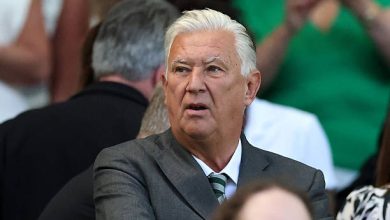Barry Ferguson Speaks Out on Threats from Rangers Fans Following Celtic’s Success: “They Have Taken Things Too Far”
In a shocking revelation, Rangers interim manager and club legend Barry Ferguson has publicly addressed the barrage of threats and abuse he has received from a section of Rangers supporters in the wake of Celtic’s recent dominance in the Scottish Premiership. The former captain, who has been at the helm since February 2025 following Philippe Clement’s sacking, expressed his dismay at the personal attacks, stating that some fans have “taken things too far” as Celtic clinched their fourth consecutive league title.
The 2024-25 season has been a turbulent one for Rangers. With Celtic securing the Premiership crown in emphatic fashion—most notably with a 5-0 thrashing of Dundee United on April 26, 2025—Rangers have struggled to keep pace. Ferguson’s tenure as interim boss has been marked by inconsistency, with the team dropping points in crucial matches, including a 2-2 draw against St Mirren and a chaotic comeback draw at Aberdeen. Despite notable victories, such as a 3-2 win over Celtic and a Europa League triumph against Fenerbahce, Rangers’ domestic failings have left fans frustrated, and some have directed their anger at Ferguson.
Celtic’s relentless success, coupled with Rangers’ elimination from the Europa League by Athletic Bilbao on April 17, 2025, has intensified the pressure on Ferguson. The former skipper, who led Rangers to multiple titles as a player, acknowledged the pain of watching their rivals celebrate. “I know what it’s like to see Celtic lift silverware—it’s horrible,” Ferguson said in a recent interview. “But that pain should fuel us to come back stronger, not lead to this kind of abuse.”
While Ferguson has always embraced the passion of Rangers’ fanbase, he admitted that the threats he has received in recent weeks have crossed a dangerous line. Sources close to the club indicate that Ferguson has been targeted with abusive messages on social media, as well as threatening phone calls and letters, with some explicitly referencing Celtic’s title win. The abuse reportedly escalated after Rangers’ lackluster performance against St Mirren, which coincided with Celtic’s title-clinching victory.
Speaking to the press, Ferguson did not mince words: “I’m a Rangers man through and through. I’ve given everything for this club as a player and now as a manager. To get threats from our own fans, especially over something as personal as this, is unacceptable. They’ve taken things too far.” He emphasized that while he understands the fans’ disappointment, resorting to threats and intimidation is “not what Rangers is about.”
Ferguson’s comments come at a time when football globally has seen a rise in fan hostility, with managers and players increasingly facing personal attacks. The interim boss called for unity, urging supporters to channel their energy into backing the team as they prepare for a crucial offseason under potential new ownership led by 49ers Enterprises.
Ferguson’s connection to Rangers runs deep. As a midfielder, he made over 400 appearances for the club, captaining them to three Scottish Premier League titles, two Scottish Cups, and three Scottish League Cups. His tenacity and leadership on the pitch made him a fan favorite, but his managerial stint has divided opinion. With a record of four wins, four losses, and two draws in his 10 matches in charge, some fans argue that Ferguson lacks the experience to lead Rangers forward, pointing to his previous managerial roles at lower-tier clubs like Clyde, Kelty Hearts, and Alloa Athletic.
Critics, including pundit Simon Jordan, have suggested that calls for Ferguson to be appointed permanently stem from “disillusioned” fans desperate for a “Rangers man” rather than a proven tactician. Others, however, praise Ferguson’s passion and game management, citing his ability to secure unexpected victories against Celtic and Fenerbahce despite inheriting a squad plagued by inconsistency.
Celtic’s recent success has exposed the gap between the two Glasgow giants. Under Brendan Rodgers, Celtic have been ruthless, with strategic recruitment—such as the signings of Daizen Maeda, Kyogo Furuhashi, and Matt O’Riley for a combined £11 million—yielding both trophies and significant transfer profits. Rangers, by contrast, have been hampered by financial waste and a squad in need of a major overhaul, issues Ferguson has been powerless to fully address in his interim role.
The impending takeover by 49ers Enterprises and the appointment of Everton’s Kevin Thelwell as sporting director signal a potential new era for Rangers. However, Ferguson’s future remains uncertain. While he has expressed a desire to stay on, either as manager or in another capacity, he insists he will not seek another managerial job elsewhere if Rangers do not retain him. “I want to make this club better, but it needs to be sorted soon,” he said after the Bilbao defeat.
Ferguson’s plea for fans to stop the threats is also a call for perspective. “We’re all hurting, but this club is bigger than any one person,” he said. “We need to stick together, not tear each other apart.” His comments have sparked a broader conversation about fan behavior, with Rangers’ official supporters’ groups condemning the abuse and urging fans to support the team constructively.
As Rangers head into their final five league games with little to play for, Ferguson remains focused on finishing the season strongly and proving his worth to the incoming owners. Whether he secures the permanent role or not, one thing is clear: the threats and abuse have no place in football, and even a club legend like Barry Ferguson is not immune to their impact.
For now, Ferguson is standing firm, embodying the resilience that made him a Rangers icon. But as Celtic’s celebrations continue across the city, the challenge for Rangers—and their fans—is to channel their passion into rebuilding a team capable of reclaiming their place at the top.





